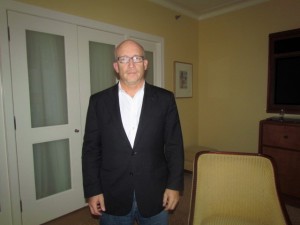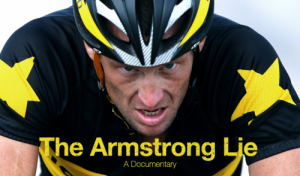
Alex Gibney Interview, ‘The Armstrong Lie’
I met filmmaker Alex Gibney at the Peninsula Hotel in Chicago on November 11, 2013. He was informative and we had a great conversation. I screened his documentary The Armstrong Lie and enjoyed the film for many reasons; in particular the cinematography of the ‘Tour de Force’ race and his in-depth look into the man that deceived the world.
SKA: Hello everyone, I’m speaking with Academy Award winning filmmaker Alex Gibney who directed the new documentary The Armstrong Lie. Welcome to Hollywood 360 Radio Network. It’s so great to have you on the show.
AG: Thanks for having me.
SKA: When you started the Armstrong film in 2008 your intent was to capture an unprecedented comeback story. In fact, your film was originally titled The Road Back. When did the film change direction?
AG: After we had more or less completed it. This change in direction would have been in 2012 when Floyd Landis began to come out in granular detail. Then there was a federal investigation, a federal criminal investigation and a grand jury investigation followed by Tyler Hamilton’s admission on ‘60 Minutes’ that not only he, but also Lance Armstrong had doped. So, suddenly the allegations that really couldn’t be spoken out loud were now very intense and very real.
SKA: Oh my goodness. I can’t imagine and your film was finished.
AG: Our film was finished. We started to add cards at first. You know, at the end of the film – first this happened, then this happened, then this happened and after a while we realized that we were going to have to have 20 or 30 pages of cards.
SKA: Exactly. I know at that point you decided to continue with the filming because you really had another story to tell and you followed Armstrong through his intensive training and his attempts to win the Tour De France in July of 2009.
AG: I was there for every stage of the tour in 2009. That year Armstrong was not the kind of dominant force that he had been in his tour wins so there was almost the underdog theory applied here.
SKA: Sure. I would imagine that in some respects you would have been rooting for him. Could you please speak to that?
AG: Here’s the big cheese coming back. He was the guy who had won it seven times but he was older now, too old really for a cyclist and he was struggling but looking like he might win. So yeah, I began to root for him.
SKA: How old was he?
AG: Thirty-eight, I believe.
SKA: Were you angry with him for lying to you as well?
AG: Yes I was. It’s not like Armstrong was the first person to lie to me on camera. I was upset with myself for allowing him to have used me as part of the PR apparatus but I also think Armstrong, with his arrogance, sensed that he could fool all of the people all of the time. That angered me because I realized that I was in some sense part of an elaborate con and yet I think in a way 2009 was the year in which Armstrong also conned himself.
SKA: Yeah.
AG: That became a very interesting part of the story.
SKA: I know. I really enjoyed the film. I was really surprised at the access that you had to him and it’s very clear. You are with his family and his children, it was very interesting that he let you so close.
AG: I think it was part of the plan. To be honest, he had a relationship with my producer Frank Marshall over a number of years and I think Frank and I convinced him that in order to make this film meaningful we had to have that kind of access.
SKA: What were your first impressions of Armstrong when you first met him?
AG: I would say that he was impressive. I would say that he was charismatic and he was forbidding. He was not a Bill Clinton type charmer. I met him at his house in Austin and he showed me his rather prodigious modern art collection. We talked a little bit about the film and what I was thinking about and I was quite honest with him. In an odd way, given the title of the film, I think that Armstrong was impressed. I honestly didn’t try to pretend that I knew a lot about cycling. I said that I was utterly ignorant and I knew that he rode a bicycle and he was good at it.
SKA: What drew you to this story in the beginning?
AG: As a filmmaker, I wanted to do a departure. I wanted to follow a story where I was on the ground floor and I was following it as it was happening rather than going in and performing a kind of autopsy after the murder. So, that was appealing to me. I’m also a big sports fan and the idea of following a world-class athlete as he tried to get back on top seemed interesting and a guy who was getting older too.
SKA: Why do you think a man who did so much good for people through his cancer foundation turned into a bully and just destroyed peoples lives like his former teammate Frankie Andreu and his wife, Robin?
AG: Well, I think you have to see it as all part of the same package and you know there are still some psychologists who believed we perform a kind of peculiar balancing act in our lives. Sometimes the good that we do we feel can be balanced by an allowance for ourselves to be naughty or ruthless or bad.
The point is that all of the good that he was doing for cancer allowed him to believe that it was okay to go after people who were threatening his story because his story was offering so much to so many. It gave him sort of a moral force. I also think Armstrong himself will say he’s a fighter and it was either you are on my side or you’re off my side. It was binary for him. There was no gray area. You’re either with me or you’re against me and once Frankie had testified against him I think he felt like that was it. I think he allowed himself to believe that all of that was okay in part because of the enormous amount of good that he was doing from the standpoint of cancer.
SKA: Sure. What was his reaction to the new title?
AG: He wasn’t wild about it but he accepted it. I heard him say to other people, “It’s okay, I’m okay with it. I did lie.” I mean, there are times when Armstrong can be very honest with himself but I think that there are other times where he doesn’t and I think that this would be a wild understatement. He doesn’t really get the big picture.
SKA: I have to tell you that I appreciate the fact that you also educate people about the grueling three-week bicycling sport. I didn’t have any idea about that process and what it involved. I read in the press notes that you used as many as ten cameras at one time to film. Could you speak to that a little bit? I felt that you really captured the event. You really captured Armstrong and that’s appreciated in this excellent film.
AG: Well, I think to understand an athlete you have to understand their sport. I think a lot of people from a distance, particularly in this country, see cycling as a sport where you get on your bicycle and you pedal and whoever is the fastest wins. They don’t have a full appreciation for the enormous courage and physical endurance it takes to race in that three-week race – going up huge mountains, sometimes sprinting up those mountains and also the amount of teamwork it takes. You know, there’s a lot of team work in those races that goes unacknowledged. The domestics or the servants as they’re called serve the lead rider, in this case Armstrong. Their job is to block the wind for him, to go back and get bottles of water and food for him. You know, that’s part of what they do for the lead rider.
SKA: Yes, I know now. I had no idea, really.
SKA: Well, I certainly appreciated that and I think this film is going to be compelling for so many people. I want to thank you so much for talking with me.
Sarah Knight Adamson© November 19, 2013

